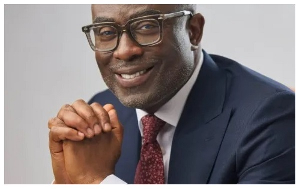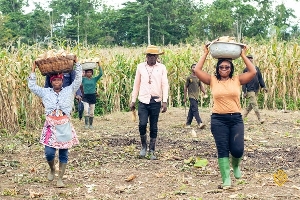- Home - News
- TWI News | TV
- Polls
- Year In Review
- News Archive
- Crime & Punishment
- Politics
- Regional
- Editorial
- Health
- Ghanaians Abroad
- Tabloid
- Africa
- Religion
- Election 2020
- Coronavirus
- News Videos | TV
- Photo Archives
- News Headlines
- Press Release
General News of Friday, 9 December 2011
Source: Daily Democrat
We Need Fair, Balance And Credible Outcome--Sherry Ayittey
COP 17 Climate change conference
Source: Daily Democrat (Emmanuel Opare Djan), Durban,
South Africa (courtesy: MEST, EPA)
Parties attending the United Nations (UN) conference on climate change in Durban, South Africa, have been urged by Ghana to fulfil pledges under the Copenhagen and Cancun agreements to provide a clear and unambiguous commitment on fast-start funding of the Climate Green Fund.
This was contained in the address delivered by Ms. Sherry Ayittey, Minister Of Environment, Science And Technology and leader of Ghana’s delegation at the ongoing COP 17/CMP7 in Durban.
The common position of Ghana, the Africa group of 77 and China as elaborated in various conventions at the conferences was reiterated by the minister.
She emphasised the importance of achieving fair, balance and credible outcome at Durban to provide a global roadmap that would define a second binding commitment period by Annex 1 state parties, taking into consideration the common desire by all parties to save our planet.
This, according to Ms. Sherry Ayittey must base on the principles of common but differentiated responsibilities, equity and the rule of law, adding that Durban must be decisive in avoiding a gap in the future of the Protocol and hoped the Kyoto Protocol would not be terminated on African soil.
“Ghana remains resolute in her call for a second commitment period, under the Kyoto Protocol,” pointed out.
Adaptation to climate change remains the main priority on Africa’s agenda at the conference, she stated, calling for a complete operationalisation of the Cancun Agreements including capitalisation of the Green Climate Fund and identification of other long term financing sources, technology development and transfer and capacity building.
She said Ghana would also like to see the establishment of the Adaptation Committee and clear guidelines on measurement, reporting and verification of NAMAs and REDD+.
Parties were also entreated to give strong consideration to climate smart agriculture and gender in national developmental plans.
The minister said, Ghana is committed to make climate change resilient by developing a policy aimed at three broad objectives of effective adaptation, low carbon growth path and social development premise of seven building blocks of governance and coordination, capacity building, finance, research and knowledge management, international cooperation, communication, monitoring and evaluation.
Ghana, she revealed, has started a pilot gender climate change project to mitigate the vulnerability of women in the northern part of the country with the adaptation strategy being finalised while the low carbon strategy is in progress.
“The main focus of the adaptation response strategy is the emphasize placed on early warning system to facilitate timely sharing of relevant information from community to national level and vice versa, to ensure that communities at all levels cope and adapt to disaster,” she said, and called on other countries to emulate Ghana’s initiative put in place internally to track the country’s carbon footprints to tackle climate change related challenges.
According to her, Ghana like many other Africa countries is hard hit by climate change impact with recurrent floods and drought resulting in loss of lives and property, decline income and movement of people searching for food and water.
The issue of climate change is a developmental one affecting all sectors of the economy like water resources, tourism, health, energy, agriculture/cocoa production, forestry, fisheries, waste management, infrastructure, marine conservation, security and sports.
“We are always reminded by leaders of small island states that climate change threatens their very existence. As the sea level rises, it threatens to wipe them off the face of the earth.” President Jacob Zuma of South Africa also made this remark in his opening address of high level talks at the conference and stressed that climate change poses serious risks to humanity, especially in the developing world.
“Climate change can no longer be treated as just an environmental challenge; it is a holistic sustainable development challenge. Various regions of the world have different views on the issue, simply because they are affected differently by climate change. However, for most people in the developing world and Africa, climate change is a matter of life and death,” South Africa’s President noted.
According to him, Africa’s vulnerability does not only stem from climate change impacts such as the rise in the sea level, severe droughts and floods. Africa is more vulnerable because of poverty which limits the ability of most African nations to cope with the impact of climate change.
Agricultural output in many African countries, he said, is expected to decrease by as much as 50% by the year 2050, which will cause serious food shortages.
The United Nations General Secretary, Ban Ki Moon, on his part, called on all parties to make the Durban conference a success by achieving four incremental advances:
First, implementation of what was agreed at Cancun to assist the most vulnerable in both obligation and smart investment in a sustainable future.
Second, the need for tangible progress on short-term and long-term financing.
Thirdly, a careful consideration for a second commitment period for part of the Kyoto protocol and finally, parties must not forsake their collective vision of a comprehensive, binding climate change agreement that is both effective and fair for all.
The concern with climate change according to, Ms Maite Nkoana-Mashabane, the incoming president of cop17/cmp7, “goes beyond the walls of this hall of the conference room to thousands and thousands of people.” Called for climate justice, she underscored the common purpose of parties in Durban to find a common solution that will secure a safe future for generations to come.
“Let Durban be the place where Parties will be able to work together, giving each other the necessary re-assurances, to secure a platform of trust,” she emphasised.










